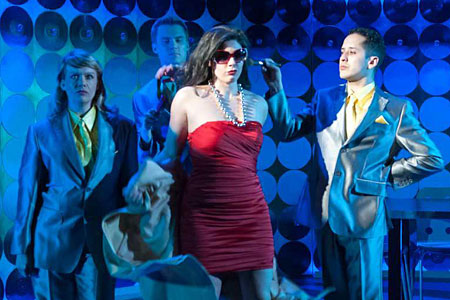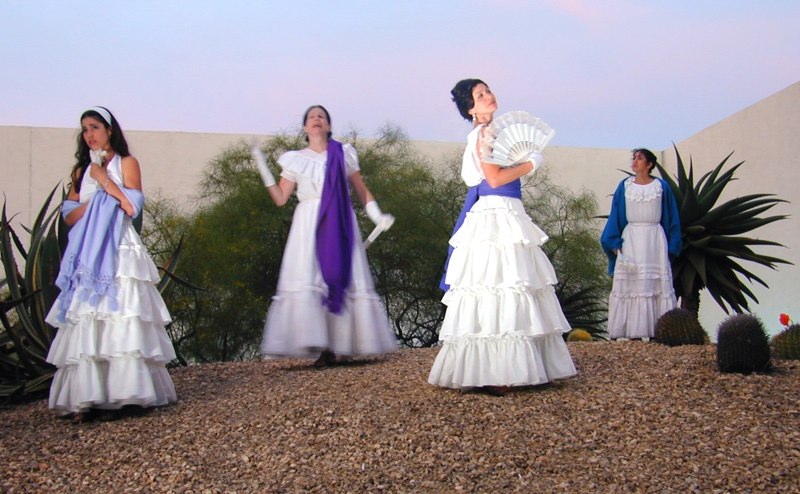In May 2012, Karen Zacarías, a playwright in residence at Arena Stage in Washington, DC, wanted to host an intimate conversation about the state of theater for US Latino/a artists. Karen decided to convene a small gathering of theater artists from across the country representing diverse voices. She felt there was a need for this meeting in light of the fact that no national advocacy groups for US Latino/a theater artists existed.
Karen asked the Center for the Theater Commons, a theater advocacy organization then at Arena Stage and now at Emerson College [1], to help facilitate the conversation. Our gathering included theater artists from across the country but was in no way intended to be representative of the breadth of the Latino/a theater scene. Eight of us (four directors and four playwrights) traveled to Arena Stage to spend a day in conversation.
In a twenty-four hour stretch, we talked about community, history, and action. We dreamed up a plan.
Celebrating Contemporary Latino/a Theater
First, we considered how Latino/a theater can reflect our contemporary US narrative. American culture in the twenty-first century continues to move from a mono-cultural to a multi-cultural experience. However, the American theater currently does not always reflect this reality and therefore can perpetuate an outdated narrative. Contemporary Latino/a theater updates the US narrative through presenting diverse cultural worlds that can allow theater audiences to more fully understand the US experience in the twenty-first century.
We emphasized that Latino/a is now a heterogeneous term including the diversity of all Spanish-speaking and indigenous cultures existing in the US from Mexico, the Caribbean, Spain, and Central and Latin America, in addition to the complexities which arise from the intersections of these cultures with non-Latino/a cultures. [2] This definition highlights the globalization of the US Latino community and mirrors the fact that life in the US is now an intercultural reality. Further, the o/a ending of this term addresses gender disparity by including both men and women. Traditionally, the Spanish masculine ending of the collective noun (“o”) is meant to include both male and female. However, adding the female ending (“a”) emphasizes the importance of empowering women in our community.
According to the 2010 US census, 308.7 million people resided in the United States, of which 50.5 million (or 16 percent) were Latino/a. The Latino/a population hails from over twenty-two Latino/a cultural groups and was the fastest growing population from 2000 to 2010. [3] American theater production historically has only reflected a fraction of this diversity. We all felt strongly that twenty-first century Latino/a theater artists are creating works that amply reflect this complexity. By embracing the current landscape of Latino/a theater, American theaters not only can present a view of contemporary Latino/a culture, they also provide their audiences with ways in which to more fully understand our multicultural US experience.
Highlighting Our History
Next, we addressed the need to remember and acknowledge the remarkable Latino/a theater artists who came before us and upon whose shoulders we now stand. From the success of Luis Valdez’ 1978 production of Zoot Suit in Los Angeles to Maria Irene Fornes’ Obie-Award winning New York City production of Fefu and Her Friends in 1977, US Latino/a theater has grown and still thrives from coast to coast. Through the support of organizations such as the Ford Foundation and the Lila Wallace–Reader’s Digest Fund, several US regional theaters have provided platforms for the continued development of Latino/a theater artists. The INTAR Playwrights Workshop in New York City, South Coast Repertory’s Hispanic Playwrights Project in Costa Mesa, California and The Mark Taper Forum’s Latino Theatre Initiative in Los Angeles became centers of training, collaboration and conversation from 1978 to 2005. These programs helped launch the careers of a generation of Latino/a theater artists including Pulitzer prize winners Nilo Cruz and Quiara Alegría Hudes, Academy-Award nominee José Rivera, Obie award winners Caridad Svich and Kristoffer Diaz and MacArthur Genius grant winner Luis Alfaro.
INTAR, founded in 1972 by Max Ferrá, is one of the longest-running companies producing Latino/a theater in the United States. [4] Maria Irene Fornes created the INTAR Hispanic Playwrights-in-Residence Laboratory (1978-1991) and trained some of the most widely produced Latino/a playwrights in the U.S. including Cruz, Svich, Alfaro, Cherrie Moraga, Migdalia Cruz and Octavio Solis. Under the current leadership of Lou Moreno, INTAR continues to produce new work by Latino/a playwrights.
Hispanic Playwrights Project (HPP), 1985-2004, created by José Cruz Gonzalez and later directed by Juliette Carrillo, featured a yearly summer festival of new works at South Coast Repertory bringing together new plays written by Latino/a playwrights. For many playwrights, HPP provided a first professional theater development opportunity. The annual gathering launched the careers of many Latino/a theater artists including Octavio Solis, Rogelio Martinez, Karen Zacarías, Kristoffer Diaz, Quiara Alegría Hudes, and Anne García-Romero.
The Latino Theatre Initiative (LTI), 1992-2005, at the Mark Taper Forum, was designed to diversify the Taper’s audience base by offering theatrical programming relevant to the Latino/a community while also providing access to emerging Latino/a artists who reflected the diversity of the city of Los Angeles. [5] Founded by José Luis Valenzuela and later codirected by Luis Alfaro and Diane Rodriguez, LTI developed new works through in-house readings, festivals and yearly writers’ retreats.
Building Upon Our Present
We spent the subsequent discussion on what is happening in today’s Latino/a theater community. At present, over forty US theater companies are dedicated to the production of plays by Latino/as (For a full listing, please reference the original publication of this article on Howlround.com). While Latino/a playwrights continue to develop their work at US theaters, festivals, and conferences, we all concurred that an artistic vacuum was created with demise of HPP and LTI. No current program exists that brings together a company of Latino/a theater artists once a year to explore the creation and development of new plays. This understanding then led us to envision what new initiatives could serve Latino/a theater artists today.
We desire a Latino/a Theater Commons that facilitates a vibrant, intergenerational conversation reflecting contemporary US Latino/a theater. Latino/a Theater Commons needs to acknowledge the gifts that Latino/a theater artists can share with each other by connecting Latino/a theater artists from across the US to create a platform and promote the latest developments in the field of Latino/a theater. Building upon the foundation of the past and highlighting the realities of the present, a Latino/a Theater Commons can create new models of engagement and presentation of Latino/a theater that will not only illuminate the wide expanse of the field but will allow audiences to update the US narrative by experiencing multi-cultural worlds on stage that reflect an ever-diversifying national reality.
Creating a Commons: Generating New Models
In our dream for a Latino/a Theater Commons, we build upon the foundation of the past and the momentum of the present to create four initiatives that will continue to advance the field of US Latino/a theater.
1. The Los Angeles Theatre Center, under the direction of José Luis Valenzuela, will produce a festival of ten Latino/a plays over the course of the 2014-15 season. This festival seeks to present ten diverse plays that will mirror the complexity of the US Latino/a community.
2. Latino/a Theater Commons will pilot a biannual conference of new Latino/a work hosted by the Theatre School at DePaul University in Chicago. The Festival will honor and be inspired by previous programs such as the Hispanic Playwrights Project, but be reconceived for the twenty-first century to allow for live and online participation and new methods of collaboration through workshops and focus groups on specific theatrical disciplines.
3. Latino/a Theater Commons will launch an online platform, Cafe Onda (Wave Cafe). This platform will be created as an online community and conversation about the current state of the Latino/a theater in the twenty-first century. Cafe Onda will contain articles, blogs and live streaming of theater events and will be linked to HowlRound, an online journal of the Theater Commons.
4. Latino/a Theater Commons will broaden the conversation by working with an expanded national cohort of Latino/a theater artists to convene in 2013 and solidify our efforts in implementing these plans that will generate a new national narrative for US theater.
Since our gathering at Arena Stage in May, we’ve created a steering committee of twenty-two prominent Latino/a theater artists to help us develop our initiatives. We feel these projects will provide a multifaceted view of contemporary Latino/a theater. Through exploring, developing and advocating for new Latino/a plays, all four initiatives generate necessary conversations about the diverse make-up of US society. We respectfully share this plan in the hopes that a Latino/a Theater Commons will advance the state of Latino/a theater while also allowing audiences to update the US narrative at the start of the twenty-first century. Onward!
Notes
[1] For more information on the Center for Theater Commons, visit their online journal, HowlRound.com.
[2] García-Romero, Anne. “Latin@: Shifting Toward A Twenty- First Century Definition” 2012: Backpages, Contemporary Theatre Review, 22:2, 285-298.
[3] Ennis, Sharon R., Ríos-Vargas, Merarys and Albert, Nora G. The Hispanic Population 2010. Washington DC: United States Census Bureau, 2011.
[4] Rodríguez, Chantal. Bringing Teatro to the Taper: Center Theatre Group’s Latino Theatre Initiative, 1992–2005. Los Angeles: UCLA Chicano Theatre Archives. 2011
[5] Please refer to Dr. Chantal Rodríguez’s essay, Bringing Teatro to the Taper: Center Theatre Group’s Latino Theatre Initiative, 1992–2005 for an in-depth exploration of LTI.
Photos, from top: Mariela in the Desert Karen Zacarías at the Goodman Theater in Chicago; Learn to Be Latina by Enrique Urueta at Mixed Blood Theater in Minneapolis; Desert Longing by Anne Garcia-Romero at South Coast Repertory in Costa Mesa, CA.
This article is adapted from an article first published in HowlRound, and we publish it it here with their kind permission.



